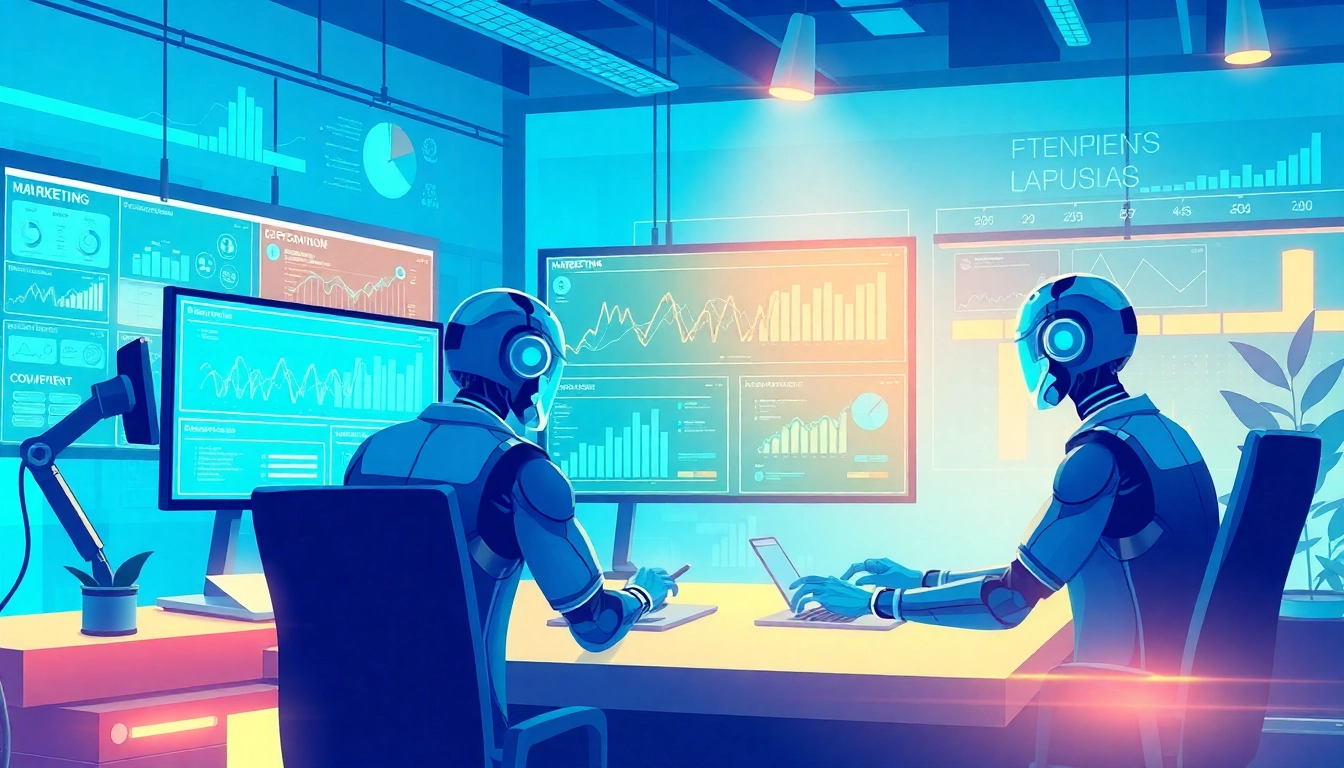Understanding AI Marketing Agents
Definition and Functions
AI marketing agents are sophisticated software tools designed to automate various marketing tasks using artificial intelligence. They often require minimal human oversight while operating with a degree of autonomy. Essentially, these agents take over repetitive and data-intensive tasks—enabling marketers to focus on strategy and innovation rather than on mundane operational details. For instance, common functions of AI marketing agents include customer segmentation, personalized content delivery, and campaign optimization. The seamless interaction of these tools with existing marketing platforms makes them essential for modern marketing strategies. AI marketing agents serve as the backbone of many contemporary marketing operations by delivering insights that can influence decisions in real-time.
Types of AI Marketing Agents
AI marketing agents can be classified into several categories based on their functionalities and applications:
- Customer Relationship Management (CRM) Agents: These agents analyze customer data to enhance interactions and optimize relationship-building activities.
- Content Creation Agents: These tools help generate website content, social media posts, or email newsletters by using natural language processing and machine learning algorithms.
- Analytics Agents: These are used to sift through data from various sources and provide actionable insights that can tweak marketing strategies.
- Social Media Agents: They can automate posting schedules, analyze engagement metrics, and even respond to comments.
- Ad Placement Agents: These enhance advertising strategies by determining the most impactful platforms, times, and formats for ad delivery.
Role in Modern Marketing
In the realm of modern marketing, the role of AI marketing agents cannot be overstated. They effectively bridge the gap between vast amounts of data and actionable marketing strategies. By processing information faster and more accurately than human teams, these agents significantly enhance the agility and effectiveness of marketing campaigns. For example, organizations can run A/B tests quicker than ever, leveraging real-time data to pivot strategies in response to consumer behavior or market trends. The ability to adapt and make data-driven decisions wields a competitive advantage that is now crucial for survival in crowded markets.
Benefits of Implementing AI Marketing Agents
Increased Efficiency and Automation
One of the primary advantages of implementing AI marketing agents is the boost in efficiency and automation they provide. By automating repetitive tasks, such as data entry and performance monitoring, businesses can allocate their resources more effectively. For instance, campaign management tools can automate the logistics of email marketing flows, ensuring that personalized messages are sent to customers based on their behavior without manual intervention. As a result, businesses can not only save time but also reduce human error and operational costs.
Enhanced Customer Insights
AI marketing agents can analyze customer behavior and preferences with unmatched precision. They evaluate various data points, such as past purchasing behavior, social media interactions, and engagement levels. The insights generated can inform businesses about what strategies resonate most with their audience. For instance, a retail company might discover that customers who engage with promotional emails are significantly more likely to convert if those emails are sent on Wednesdays. Understanding these nuances allows marketers to tailor their campaigns effectively, leading to higher conversion rates.
Real-Time Data Processing
In a rapidly changing marketplace, real-time data processing is invaluable. AI marketing agents excel in processing large datasets quickly. This capability allows businesses to track the performance of their campaigns in real-time, adjusting tactics as necessary. For example, if an email campaign is performing poorly, AI tools can quickly suggest alternatives—a different subject line or call-to-action—based on historical success patterns. This responsive capability can drastically reduce the time taken to identify and rectify shortcomings in marketing initiatives.
Choosing the Right AI Marketing Agent
Evaluating Features and Capabilities
When selecting an AI marketing agent, evaluation criteria should include the tool’s functionality, ease of use, and integration capabilities. Features to look out for might include analytics dashboards, CRM integration, and compatibility with existing tools. Businesses should set clear objectives before selection, identifying the specific marketing challenges they aim to solve with AI assistance.
Integration with Existing Tools
Integration is critical when adopting new technology. An AI marketing agent should seamlessly integrate with existing marketing platforms and tools to ensure smooth operations. For example, if a business utilizes a particular CRM system, it’s essential to ensure that the AI tool can easily communicate with that system to sync customer data. A disconnected tool can slow down processes rather than enhance them, defeating the purpose of implementing an advanced solution.
Cost Considerations and ROI
While cost can be a significant barrier for businesses considering the adoption of AI marketing agents, it’s crucial to assess the ROI potential. A thorough analysis should consider not just the upfront costs but also long-term benefits, including time savings, increased sales, and enhanced customer satisfaction. Selecting a tool that offers a free trial or a flexible pricing plan can help businesses test the waters before making a significant investment. Tracking and measuring the efficiency gains through KPIs can provide a concrete understanding of value received.
Case Studies of Successful Implementation
Industry Examples
A myriad of brands across different industries has leveraged AI marketing agents for substantial gains. For instance, Coca-Cola employed machine learning algorithms to predict consumer preferences and optimize marketing campaigns accordingly. By using AI to analyze vast datasets, they tailored messaging to align with customer interests, ultimately enhancing brand loyalty and engagement.
Another example can be seen in the fashion industry, where brands like Stitch Fix utilized AI algorithms to analyze customer data and deliver personalized clothing recommendations. This targeted approach led to higher conversion rates and customer satisfaction, showcasing the effectiveness of tailoring offerings in the retail sector.
Measuring Success Metrics
To gauge the success of AI marketing agents, businesses can track key performance indicators (KPIs) such as conversion rates, customer acquisition costs, and overall return on investment. Surveys and customer feedback can also illustrate qualitative benefits, painting a fuller picture of how AI tools impact consumer experiences. Implementing tools with robust analytics features allows marketers to monitor these metrics and adjust strategies accordingly.
Lessons Learned
Successful implementation of AI marketing agents is not without challenges. Companies like Stitch Fix highlighted the importance of marrying human insight with AI capabilities to craft solutions that resonate profoundly with consumers. Additionally, training staff to understand and utilize these technologies is crucial for overcoming initial resistance and maximizing the tools’ impact.
Future Trends in AI Marketing Agents
Innovative Technologies on the Horizon
The landscape of AI marketing agents continues to evolve rapidly. Emerging technologies such as predictive analytics, natural language processing, and machine learning are enhancing the capabilities of these tools. For instance, advancements in sentiment analysis allow marketers to better understand customer emotional responses towards brands, refining messaging strategies accordingly.
Impact on Marketing Strategies
As AI marketing agents gain more traction, they will inevitably reshape strategic marketing approaches. The increase in automation can lead to more dynamic marketing strategies, where campaigns evolve in real-time based on performance data. Marketers will need to become increasingly adept at integrating these insights into their broader strategies, ensuring that they utilize the full potential of AI-driven insights.
Preparing for Change
As organizations adopt AI marketing agents, change management will play a pivotal role. Preparing teams to embrace these tools through training and fostering a culture of innovation is essential for successful adoption. By outlining clear objectives and encouraging a mindset that values data-driven decision-making, companies can ensure they remain competitive in the ongoing marketing evolution.



